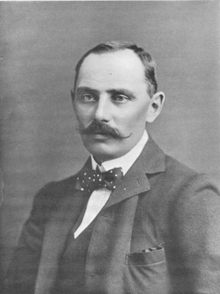Bryan Mahon
| Sir Bryan Mahon | |
|---|---|

Bryan Mahon
|
|
| Born |
2 April 1862 Galway, Ireland |
| Died | 29 September 1930 (aged 68) Dublin, Ireland |
| Allegiance |
|
| Service/branch |
|
| Years of service | 1883 - 1921 |
| Rank | General |
| Commands held |
10th (Irish) Division Western Frontier Force Commander-in-Chief, Ireland |
| Battles/wars |
Second Boer War World War I |
| Awards |
Knight Commander of the Order of the Bath KCMG Distinguished Service Order |
General Sir Bryan Thomas Mahon KCB KCVO PC (Ire) DSO (2 April 1862 – 29 September 1930) was an Irish born general of the British Army and Senator of the Irish Free State.
Mahon was born at Belleville, County Galway on 2 April 1862. He became a lieutenant in the 8th (King's Royal Irish) Hussars in 1883. He served in Sudan in the Dongola Expedition in 1896 as Staff officer to Sir Herbert Kitchener, and was present at the Battle of Ferkeh and the operations at Hafir. In 1899 he took part in the final defeat of the Khailfa as Assistant Adjutant general in charge of Intelligence, and was mentioned in despatches (dated 25 November 1899) by Colonel Wingate with the following words:
I cannot speak in sufficiently strong terms of the excellence of the services performed by this officer. I invariably placed him in general command of all the mounted troops; his personal disregard for danger, intrepid scouting, and careful handling of men, all fit him for high command; his bold and successful seizure of the position in front of Fedil's camp, and his conduct of the fight before I came up, show him to possessed of exceptional qualities as a commander.
During the Second Boer War Colonel Mahon led a flying column 2,000 strong, and consisting mainly of South African volunteers from Kimberley, which came to the Relief of Mafeking. The town, which had been under siege for seven months by Boer forces, was facing starvation. Mahon was appointed a Companion of the Order of the Bath (CB) for his services during the operations, and was invested with the order by King Edward VII on 2 June 1902.
...
Wikipedia
